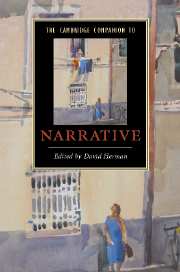Book contents
- Frontmatter
- Part I Preliminaries
- Part II Studying narrative fiction: a starter-kit
- Part III Other narrative media (a selection)
- Part IV Further contexts for narrative study
- 13 Gender
- 14 Rhetoric/ethics
- 15 Ideology
- 16 Language
- 17 Cognition, emotion, and consciousness
- 18 Identity/alterity
- Glossary
- Further reading
- Index
18 - Identity/alterity
from Part IV - Further contexts for narrative study
Published online by Cambridge University Press: 28 September 2007
- Frontmatter
- Part I Preliminaries
- Part II Studying narrative fiction: a starter-kit
- Part III Other narrative media (a selection)
- Part IV Further contexts for narrative study
- 13 Gender
- 14 Rhetoric/ethics
- 15 Ideology
- 16 Language
- 17 Cognition, emotion, and consciousness
- 18 Identity/alterity
- Glossary
- Further reading
- Index
Summary
Identity and alterity (or otherness) are key concerns in the context of postcolonial studies, which focuses on the power relations between colonizer and colonized. Until recently, however, the centrality of identity and alterity for narrative theory has not been sufficiently recognized. While the final part of my chapter will focus on identity and alterity in postcolonial narratives, I will begin by considering two more general questions; namely (1) the status of identity in narrative and narrating (outside a postcolonial framework); and (2) the importance of alterity, difference, or deviation from cultural, societal, narrative, and stylistic norms that are constitutive of storytelling. The basic argument of the chapter is that issues of identity and alterity are relevant to all narratives, even though - for thematic and ideological reasons - they seem to be more prominently addressed in postcolonial texts.
- Type
- Chapter
- Information
- The Cambridge Companion to Narrative , pp. 260 - 273Publisher: Cambridge University PressPrint publication year: 2007
- 14
- Cited by

